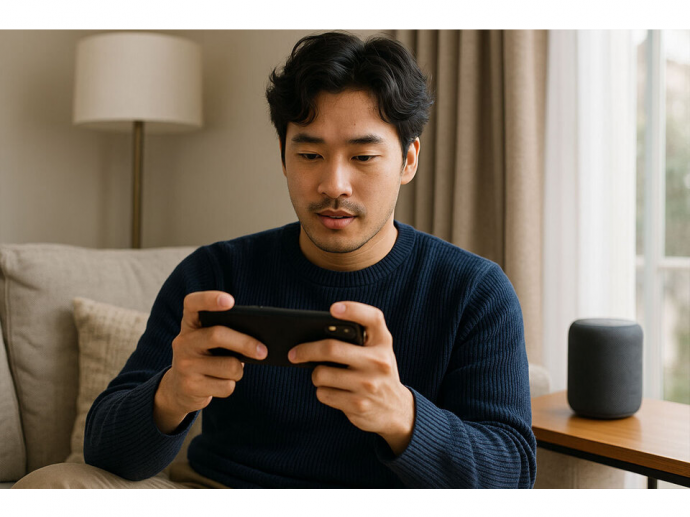Categories more
- Adventures (17)
- Arts / Collectables (15)
- Automotive (37)
- Aviation (11)
- Bath, Body, & Health (77)
- Children (6)
- Cigars / Spirits (32)
- Cuisine (16)
- Design/Architecture (22)
- Electronics (13)
- Entertainment (4)
- Event Planning (5)
- Fashion (46)
- Finance (9)
- Gifts / Misc (6)
- Home Decor (45)
- Jewelry (41)
- Pets (3)
- Philanthropy (1)
- Real Estate (16)
- Services (23)
- Sports / Golf (14)
- Vacation / Travel (60)
- Watches / Pens (15)
- Wines / Vines (24)
- Yachting / Boating (17)
Lifestyle Investments: Why Smart Tech Is the Next Luxury Frontier
Published
09/07/2025Luxury has never been just about things. It's a reflection of what a culture values, a badge of taste, and an investment in the way people wish to live.
Today, when we talk of lifestyle investments, a new era is emerging, and that is smart tech. When it was once viewed as functional only, it's now becoming the next luxury frontier, influencing the way the wealthy think about comfort, prestige, and identity.
Luxury Isn't What It Used to Be
For centuries, luxury equated with scarcity and craftsmanship. A Swiss watch, a hand-stitched bag, or an estate set in the back of beyond was the hallmark of wealth and exclusivity. But as lives changed, so did luxury. Experience became more important than material things. Well-being became a status symbol. And now, the intelligence of how smoothly a life can be augmented by technology is coming to the forefront.
Here's the thing: old luxury was all about owning, but new luxury is all about optimization. It's not merely about more. It's about getting better, and this is just where smart tech comes in.
Why Smart Tech Is Part of the Luxury Conversation
Smart tech can look mass-produced on the surface, such as smartphones, voice assistants, and fitness trackers. But luxury is never about the product. It's about design, scarcity, and cultural timing.
When approached with these principles in mind, technology ticks all the luxury boxes.
- Personalization: Luxury has long been personalised to the individual. AI-based systems now provide bespoke experiences that no traditional good could possibly duplicate.
- Design: Today's most advanced devices are not only useful but also sculptural, merging with interiors and wardrobes.
- Status signaling: Adopting new technologies early is a form of displaying cultural capital. The smartest home or wearable says as much about taste as couture.
No wonder that even wellness technology, which was once bulk and clinical, has moved into the luxury ranks. Devices such as air purifiers, sleep systems, and even the best vaporizers for relaxation are now designed with an elegance that speaks to discretion and sophistication.
Personalization on a Deeper Level
Exclusivity is what luxury feeds on, and today's most exclusive is data-driven personalization. Intelligent systems are able to learn an individual's rhythms, tastes, behavior, and moods. That means luxury is not only tailor-made anymore but highly adaptive.
Take a watch, for instance. A watch no longer simply keeps time; it monitors recovery, sleep patterns, and stress, providing insights previously in the domain of high-end clinics. Similarly, houses no longer simply wow with form; they're now able to sense their owner's lighting, music, and climate needs without so much as a verbal command.
This is luxury not as spectacle, but as sensitivity.
Wellness as the New Status Symbol
One of the most obvious ways smart tech represents the next luxury frontier is in health. Wellness is now cultural currency. In a world where the whole world is busy, what signals status isn't excess but mastery over time, energy, and wellbeing.
Smart technology makes this possible. Sleep-maximizing beds, circadian lighting, AI fitness mirrors, and mindfulness gadgets are all investments in life extension.
To the wealthy, demonstrating a focus on individual wellness via smart devices conveys more than any logo ever can.
This is the reason why luxury homes are increasingly incorporating wellness technologies as a standard feature. From air purification systems to biometric fitness centers, living in an environment that actually supports wellness is the ultimate luxury feature.
From Mobility to Immersion
The luxury automobile industry is the perfect example of this frontier. Defined by horsepower and interior previously, today it is shaped by intelligence. Cars that integrate into smart homes, track driver wellness, and change as a result of environmental factors represent 2025 prestige better than sheer speed ever could.
The same applies to entertainment. Mood-sensitive home theatres, AI-powered immersive art, and customized soundscapes are a testament to the way technology-driven immersion has become the latest indulgence. Luxury no longer means sitting in front of a screen; it means being wrapped in an experience.
Why Smart Tech Is an Investment, Not Just an Indulgence
That's what distinguishes smart tech from all other indulgences: it changes. A diamond necklace will appear the same in twenty years. A smart system evolves, refreshes, and harmonizes with new lifestyles. That means luxury technology does more than maintain value; it grows it by increasing the quality of life year after year.
Prosperous consumers now consider these purchases as lifestyle investments. They're not merely investing in a device; they're investing in a future where life is more efficient, healthier, and intelligently curated.
Conclusion
So why is smart tech the future of luxury? Because it corresponds with the contemporary definition of luxury on all levels. It's personalized, wellness-oriented, sustainable, unobtrusive, and dynamic. It doesn't simply indicate wealth; it indicates foresight, responsibility, and a higher standard of living.
As artificial intelligence becomes more intuitive, the most desirable luxuries will be those that predict needs with almost human accuracy. And that means smart technology isn't just a new category in luxury, but the actual future of luxury.















